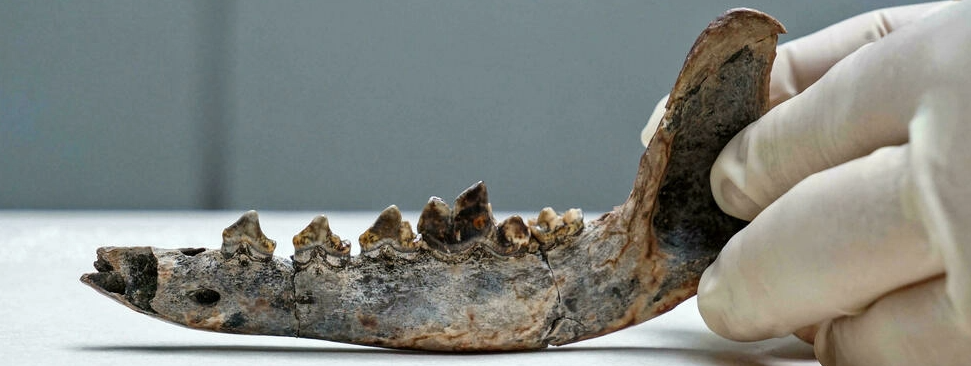International
Researchers say fossil shows humans, dogs lived in C. America in 10,000 BC

AFP
The fossil of a jaw bone could prove that domesticated dogs lived in Central America as far back as 12,000 years ago, according to a study by Latin American scientists.
The dogs, and their masters, potentially lived alongside giant animals, researchers say.
A 1978 dig in Nacaome, northeast Costa Rica, found bone remains from the Late Pleistocene.
Excavations began in the 1990s and produced the remains of a giant horse, Equus sp, a glyptodon (a large armadillo), a mastodon (an ancestor of the modern elephant) and a piece of jaw from what was originally thought to be a coyote skull.
“We thought it was very strange to have a coyote in the Pleistocene, that is to say 12,000 years ago,” Costa Rican researcher Guillermo Vargas told AFP.
“When we started looking at the bone fragments, we started to see characteristics that could have been from a dog.
“So we kept looking, we scanned it… and it showed that it was a dog living with humans 12,000 years ago in Costa Rica.”
The presence of dogs is a sign that humans were also living in a place.
“We thought it was strange that a sample was classified as a coyote because they only arrived in Costa Rica in the 20th century.”
– First of its kind –
The coyote is a relative of the domestic dog, although with a different jaw and more pointed teeth.
“The dog eats the leftovers from human food. Its teeth are not so determinant in its survival,” said Vargas.
“It hunts large prey with its human companions. This sample reflects that difference.”
Humans are believed to have emigrated to the Americas across the Bering Strait from Siberia to Alaska during the last great ice age.
“The first domesticated dogs entered the continent about 15,000 years ago, a product of Asians migrating across the Bering Strait,” said Raul Valadez, a biologist and zooarcheologist from the National Autonomous University of Mexico.
“There have never been dogs without people,” Valadez told AFP by telephone.
The presence of humans during the Pleistocene has been attested in Mexico, Chile and Patagonia, but never in Central America, until now.
“This could be the oldest dog in the Americas,” said Vargas.
So far, the oldest attested dog remains were found in Alaska and are 10,150 years old.
Oxford University has offered to perform DNA and carbon dating tests on the sample to discover more genetic information about the animal and its age.
The fossil is currently held at Costa Rica’s national museum but the sample cannot be re-identified as a dog without validation by a specialist magazine.
“This dog discovery would be the first evidence of humans in Costa Rica during a period much earlier” than currently thought, said Vargas.
“It would show us that there were societies that could keep dogs, that had food surpluses, that had dogs out of desire and that these weren’t war dogs that could cause damage.”
International
New York Announces First 2,000 Seats in Universal 2-K Program

The Governor of New York, Kathy Hochul, and New York City Mayor Zohran Mamdani took another step today in their universal early education agenda by announcing the communities that will have access to the first 2,000 seats in the new 2-K program this fall — an initiative backed by a $73 million investment.
The funding is part of the $1.2 billion package previously unveiled by Hochul to strengthen child care and early childhood education across the city, one of the key campaign promises of the now Social Democratic mayor.
At the time of the announcement, the governor also outlined additional funds to reinforce the existing 3-K early education infrastructure, a program launched under former Mayor Bill de Blasio (2014–2021).
When the 2-K initiative was introduced in January, Mayor Mamdani explained that its first phase would offer 2,000 seats, with the goal of eventually expanding into a universal program — a commitment supported by the governor.
State investment in child care and preschool services is expected to increase to $4.5 billion by fiscal year 2027.
Among the first communities set to benefit from the 2,000 seats are Upper Manhattan and Inwood — areas with large Dominican populations — as well as Fordham and Kingsbridge in the Bronx, a borough with a Latino majority.
In East Brooklyn, Canarsie, Brownsville, and Ocean Hill will also be included. Meanwhile, Ozone Park and the Rockaways are among the neighborhoods that will see the rollout of the 2-K program.
International
Warner Bros. Developing First ‘Game of Thrones’ Movie With ‘Andor’ Writer

Warner Bros. is developing the first feature film based on the hit saga Game of Thrones, with Beau Willimon — screenwriter of Andor — attached to direct, according to a report published Tuesday by Page Six.
The project, currently in early development, will focus on the conquest of King Aegon I Targaryen. A separate television adaptation centered on the same historical storyline within the franchise is also in early stages at HBO.
However, the outlet noted that it remains unclear whether the film will move forward following the recent acquisition of Warner Bros. Discovery by Paramount Skydance.
If the merger is finalized, the movie could potentially be shelved, although that scenario appears unlikely given that the Game of Thrones franchise remains one of HBO’s most valuable and beloved properties.
After six seasons adapting the work of George R. R. Martin, the platform expanded the universe with House of the Dragon, a prequel series set 200 years before the events of Game of Thrones that explores the history of House Targaryen.
International
Spain’s Prime Minister to Address Nation Amid Trump’s Trade Threats

The Prime Minister of Spain, Pedro Sánchez, will deliver an institutional address this Wednesday at the Moncloa Palace regarding the escalating situation in the Middle East and recent threats directed at Spain by U.S. President Donald Trump.
The Spanish government announced that Sánchez will make a statement at 9:00 a.m. local time to outline his position on the latest developments following the U.S. and Israeli attacks on Iran.
Sánchez is expected to reiterate Spain’s reasons for opposing the use of U.S. military bases on Spanish soil in the operation—an action he has already described as being outside international law—while also expressing criticism of the Iranian regime.
Government sources indicated that the address had been planned prior to Trump’s remarks criticizing Spain’s stance. However, following those comments, Sánchez is now also expected to respond directly to the U.S. president’s statements.
Trump has threatened to “cut all trade with Spain” and said he wants “nothing to do” with the country after Madrid refused to authorize the use of the Morón and Rota military bases in southern Spain for operations against Tehran.
The U.S. president also labeled Spain “a terrible NATO partner” and warned that “no one” would tell him he could not use the facilities.
In response, the Spanish government stated that Spain fulfills its commitments to NATO and European defense. It also warned Trump that any review of bilateral trade relations must respect international law and the agreements in place between the European Union and the United States.
-

 International2 days ago
International2 days agoIran Reports 201 Dead, 747 Injured After U.S. and Israeli Strikes
-

 International2 days ago
International2 days agoPope Leo XIV Urges End to ‘Spiral of Violence’ in Middle East
-

 International4 days ago
International4 days agoTrump Floats “Friendly Takeover” of Cuba Amid Rising Tensions
-

 Sin categoría3 days ago
Sin categoría3 days agoTrump: ‘We Think It’s True’ Amid Claims Iran’s Supreme Leader Was Killed
-

 International3 days ago
International3 days agoSecurity Council to Hold Emergency Meeting on Middle East Crisis
-

 International1 day ago
International1 day agoBrazil’s Supreme Court Rejects Bolsonaro’s Bid for House Arrest
-

 International4 days ago
International4 days agoArgentina’s Senate Reviews Milei-Backed Labor Overhaul
-

 International1 day ago
International1 day agoAnti-ICE Billboard Campaign Targets Immigration Spending in 31 U.S. Cities
-

 International1 day ago
International1 day agoTrump Warns of ‘Major Wave’ of Attacks as Iran Conflict Escalates
-

 International1 day ago
International1 day agoMexico Calls for Immediate Probe After National Dies in ICE Custody
-

 Central America1 day ago
Central America1 day agoPanama Canal Monitoring Trade as Middle East Conflict Disrupts Shipping
-

 International1 day ago
International1 day agoBolivia Orders Three Investigations Into Deadly Military Plane Crash
-

 International4 hours ago
International4 hours agoNew York Announces First 2,000 Seats in Universal 2-K Program
-

 International4 hours ago
International4 hours agoSpain’s Prime Minister to Address Nation Amid Trump’s Trade Threats
-

 Central America4 hours ago
Central America4 hours agoGuatemala’s Attorney General Fails in Bid for Top Court Seat Amid Corruption Allegations
-

 International4 hours ago
International4 hours agoWarner Bros. Developing First ‘Game of Thrones’ Movie With ‘Andor’ Writer




























